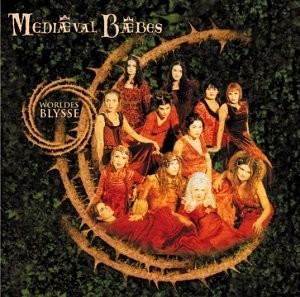 Ian Walden wrote this review which ran, I think, on Roots and Branches.
Ian Walden wrote this review which ran, I think, on Roots and Branches.
Cover art for “Worldes Blysse”I couldn’t get this CD at recent Medieval Baebes concerts I attended – apparently because sales at the concert don’t count towards their position in the Classical Music charts, so I was delighted to find a copy in my local store today.
An interesting album – for all the apparent happiness of the title, many of the songs reflect on darker themes of death and decay, of lamented love and of sacrifice. “Kinderly” sums up a life in a few short lines from the tears of birth to the stench of death. “When Thy Turuf…” ponders the worth of worldly pleasures once you are in the grave. In “Swete Sone” a mother laments the loss of her son, bound and nailed to a cross.
This is not to say that it is a depressing album – far from it – there are also songs of celebration and joy. “Love Me Broughte” sings of how love brought the redemption of mankind. “Ecce Mundi Gaudium” – another celebration song in the style of the better known “Gaudete” from their previous album. “Alba” is an almost wistful song – as the lovers part at dawn, she prays for his safekeeping until they can be together again. In “Pearl”, the narrator describes how the beautiful countryside of a river valley fills them with joy and eases their pain, and yet, even here, there is a longing for the paradise on the other side of the river, a paradise that, for all their longing, they cannot seem to reach.
The singing is, as before excellent. Plenty of good harmony and some very good solos. It is also good to hear Dorothy Carter’s voice. Dorothy, who normally plays the various instruments, speaks the lines for “So Sprichte Das Leben” with the girls just adding their voices to the chorus.
The arrangements are a little more adventurous than on the previous album “Salva Nos” and this gives much greater variety in mood and feel. It is interesting how some of the arrangements give an different slant – for example, on “Ecce Mundi Gaudium” (“Lo, the joy of the world / Lo the salvation of the people / the virgin has borne a son”), the sound is not so much of a church hall as of a gathering around a pagan campfire.
The highlight for me has to be the final track “How Death Comes”. The girls whisper the various lines of the song in a staccato round, building in intensity until they begin to sing the last line of each verse – “All too late…”, holding the last note until they all finish together. This one always has my spine tingling.
Lyrics, with translations (for those whose knowledge of Medieval Italian or Middle English is a little rusty), are provided, though they are sometimes a little difficult to read over the artistic photographs of the Baebes. Sometimes also, the printed words don’t seem to match the ones you hear.
All in all, an excellent album. The translation provided for “C’est La Fin” reads simply “It’s the end, whatever people say, I loved”. I couldn’t have put it better.
(Virgin Records, 1998)
